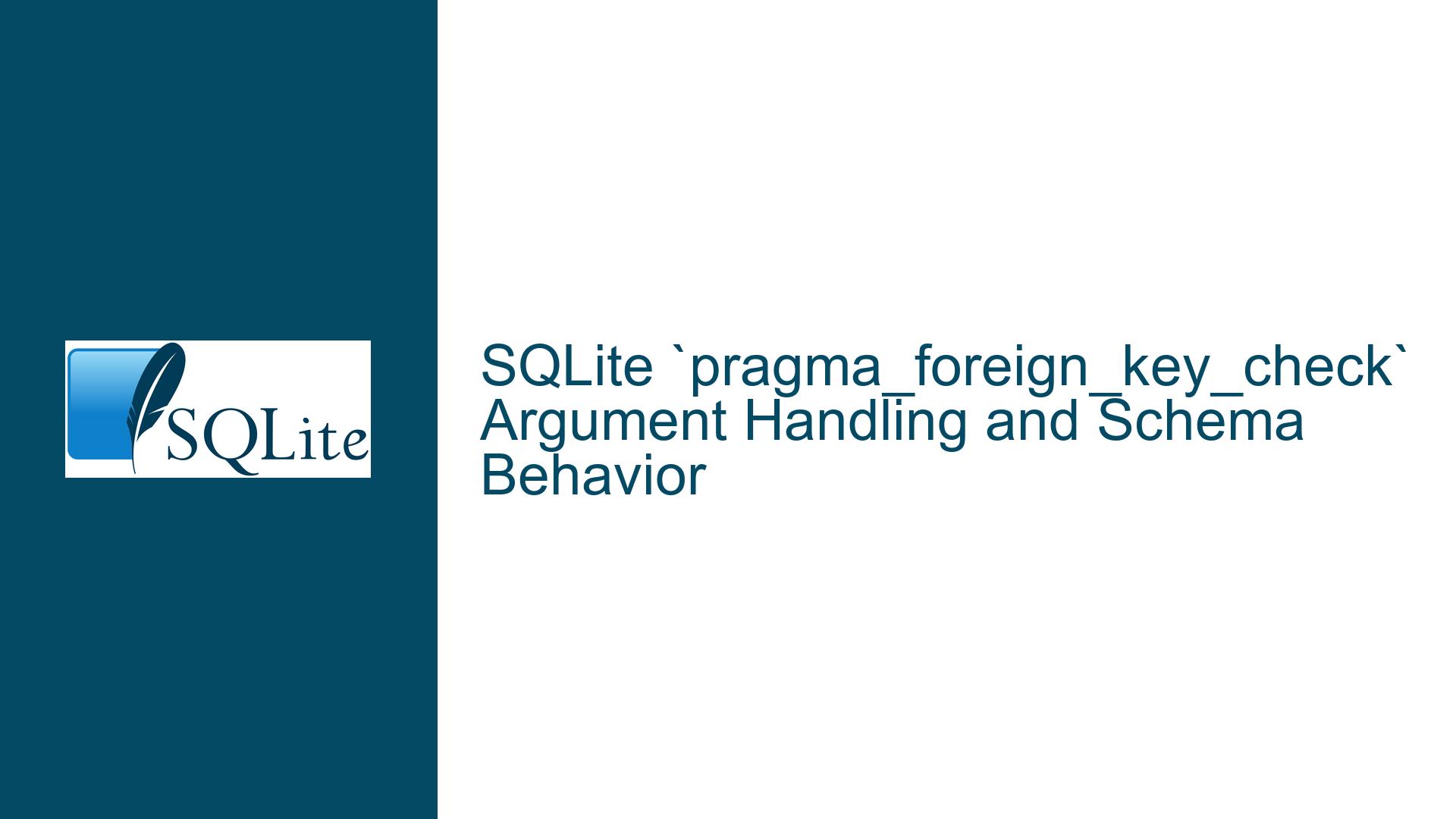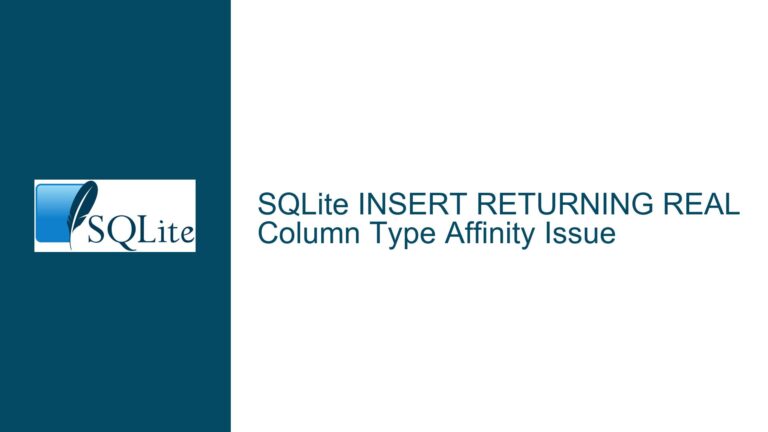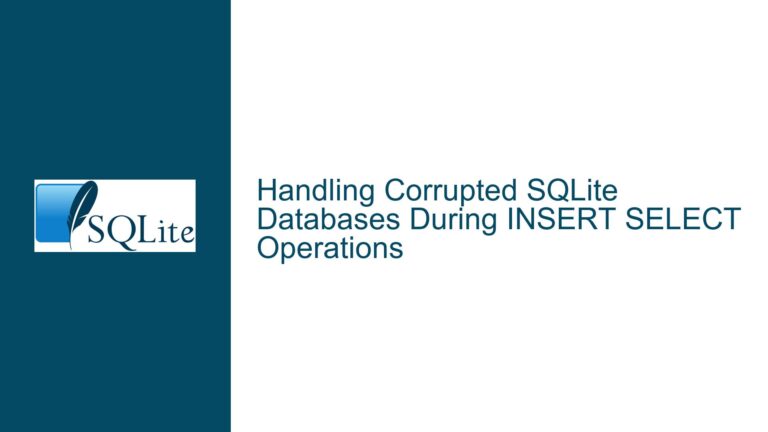SQLite `pragma_foreign_key_check` Argument Handling and Schema Behavior
pragma_foreign_key_check Argument Limitation and Schema Ambiguity
The pragma_foreign_key_check function in SQLite is designed to verify the integrity of foreign key constraints within a database. However, a significant issue arises when attempting to use this function in its table-valued form, specifically when passing an argument to restrict the check to a specific table. The function, as currently implemented, does not accept any arguments, which contradicts the behavior of its PRAGMA counterpart, pragma foreign_key_check, which does accept a table name as an argument. This inconsistency creates confusion and limits the utility of the table-valued function.
Furthermore, the function does not provide schema information in its output, making it difficult to determine which schema a foreign key constraint belongs to when multiple schemas are involved. This lack of schema attribution can lead to ambiguous results, especially in databases with identically named tables across different schemas. The function also does not allow filtering by schema or table name in its table-valued form, which further complicates its use in multi-schema environments.
Misalignment Between PRAGMA and Table-Valued Function Behavior
The core of the issue lies in the misalignment between the behavior of the pragma foreign_key_check statement and its table-valued function counterpart, pragma_foreign_key_check. According to SQLite’s documentation, table-valued functions for PRAGMAs should accept the same arguments as their PRAGMA counterparts. However, pragma_foreign_key_check does not adhere to this expectation. While the PRAGMA statement allows specifying a table name to restrict the check, the table-valued function rejects any arguments, returning an error if one is provided.
This discrepancy is rooted in the implementation of the pragma_foreign_key_check function. The function is defined with a flag (PragFlg_Result0) that indicates it does not accept any arguments. This flag should be changed to PragFlg_Result1 to align with the behavior of the PRAGMA statement and the documented functionality. Additionally, the function does not include hidden columns for schema and argument handling, unlike other PRAGMA table-valued functions such as pragma_foreign_key_list. This omission prevents the function from being used in a manner consistent with other PRAGMA table-valued functions.
Implementing Schema Attribution and Argument Handling in pragma_foreign_key_check
To resolve these issues, several changes are necessary. First, the pragma_foreign_key_check function should be modified to accept arguments, aligning it with the behavior of the pragma foreign_key_check statement. This can be achieved by updating the flag in the function’s definition from PragFlg_Result0 to PragFlg_Result1. This change would allow the function to accept a table name as an argument, enabling users to restrict the foreign key check to a specific table.
Second, the function should be enhanced to include schema attribution in its output. This would involve adding a hidden column for the schema name, similar to the implementation in pragma_foreign_key_list. By including the schema name in the output, users can easily identify which schema a foreign key constraint belongs to, eliminating ambiguity in multi-schema environments.
Finally, the function should support filtering by schema and table name in its table-valued form. This would allow users to specify both the schema and table name when performing a foreign key check, providing greater flexibility and control. The default behavior should remain unchanged, checking all foreign key constraints in all tables across all schemas if no arguments are provided.
Workarounds and Best Practices
Until these changes are implemented, users can employ workarounds to achieve the desired functionality. For example, to restrict the foreign key check to a specific table, users can apply a WHERE clause to the pragma_foreign_key_check function, filtering the results based on the table column. However, this approach does not address the lack of schema attribution or the inability to filter by schema.
To ensure clarity and avoid ambiguity, it is recommended to explicitly specify the referenced column when defining foreign key constraints. For example, instead of create table bar(y integer references foo);, use create table bar(y integer references foo(x));. This practice improves readability and ensures that the foreign key reference is unambiguous.
Example Usage and Expected Behavior
The following examples illustrate the current behavior of pragma_foreign_key_check and the proposed changes:
Current Behavior
-- Create tables
create table foo(x integer primary key);
create table bar(y integer references foo(x));
-- Check foreign keys for a specific table (fails)
select * from pragma_foreign_key_check('bar');
-- Error: too many arguments on pragma_foreign_key_check() - max 0
-- Check all foreign keys (works but lacks schema attribution)
select * from pragma_foreign_key_check();
Proposed Behavior
-- Check foreign keys for a specific table (works)
select * from pragma_foreign_key_check('bar');
-- Check foreign keys for a specific table in a specific schema (works)
select * from pragma_foreign_key_check('main.bar');
-- Check all foreign keys (works with schema attribution)
select * from pragma_foreign_key_check();
Output with Schema Attribution
| table | rowid | parent | fkid | schema |
|---|---|---|---|---|
| bar | 1 | foo | 0 | main |
By implementing these changes, SQLite would provide a more consistent and flexible interface for checking foreign key constraints, aligning the behavior of pragma_foreign_key_check with user expectations and the functionality of other PRAGMA table-valued functions.






